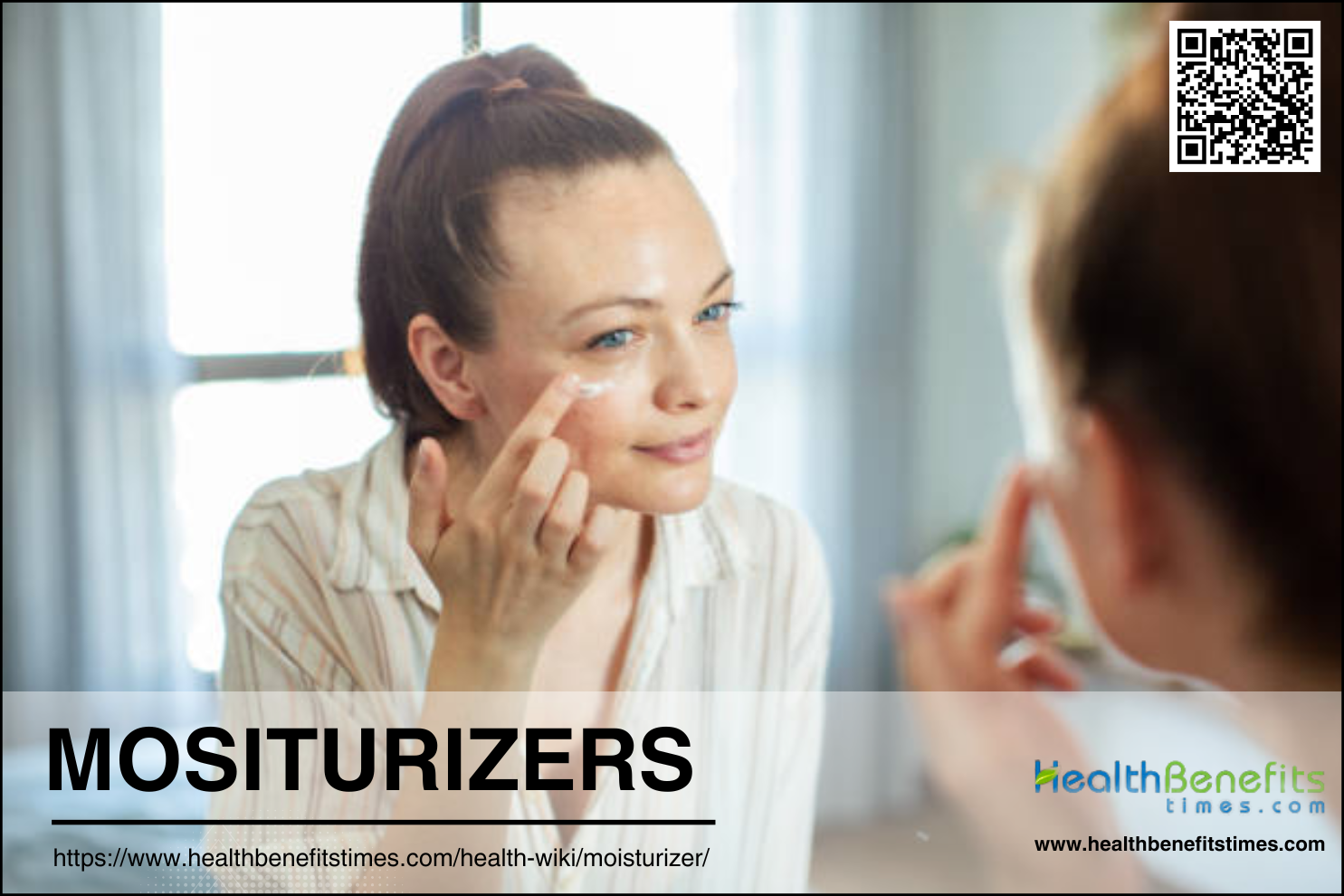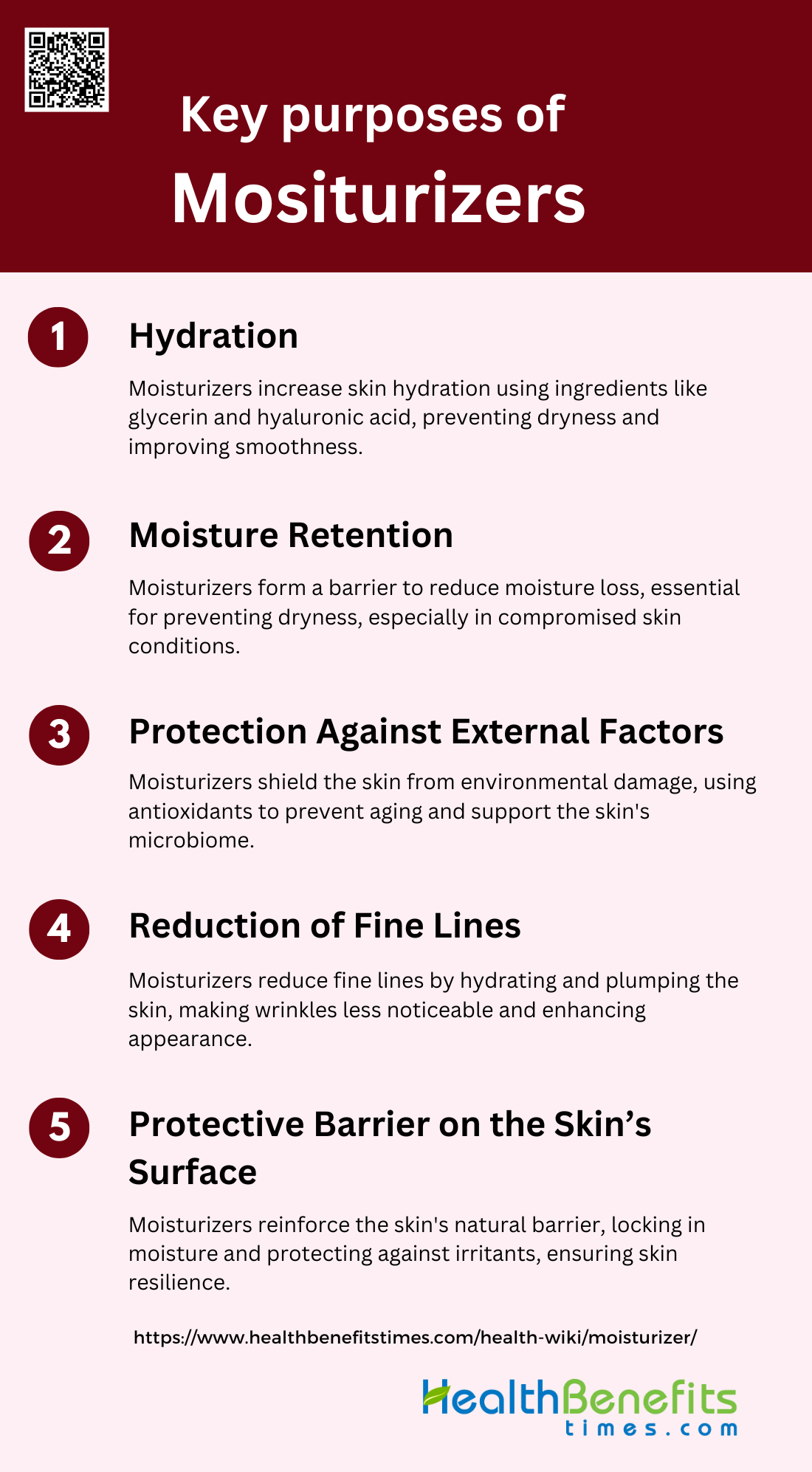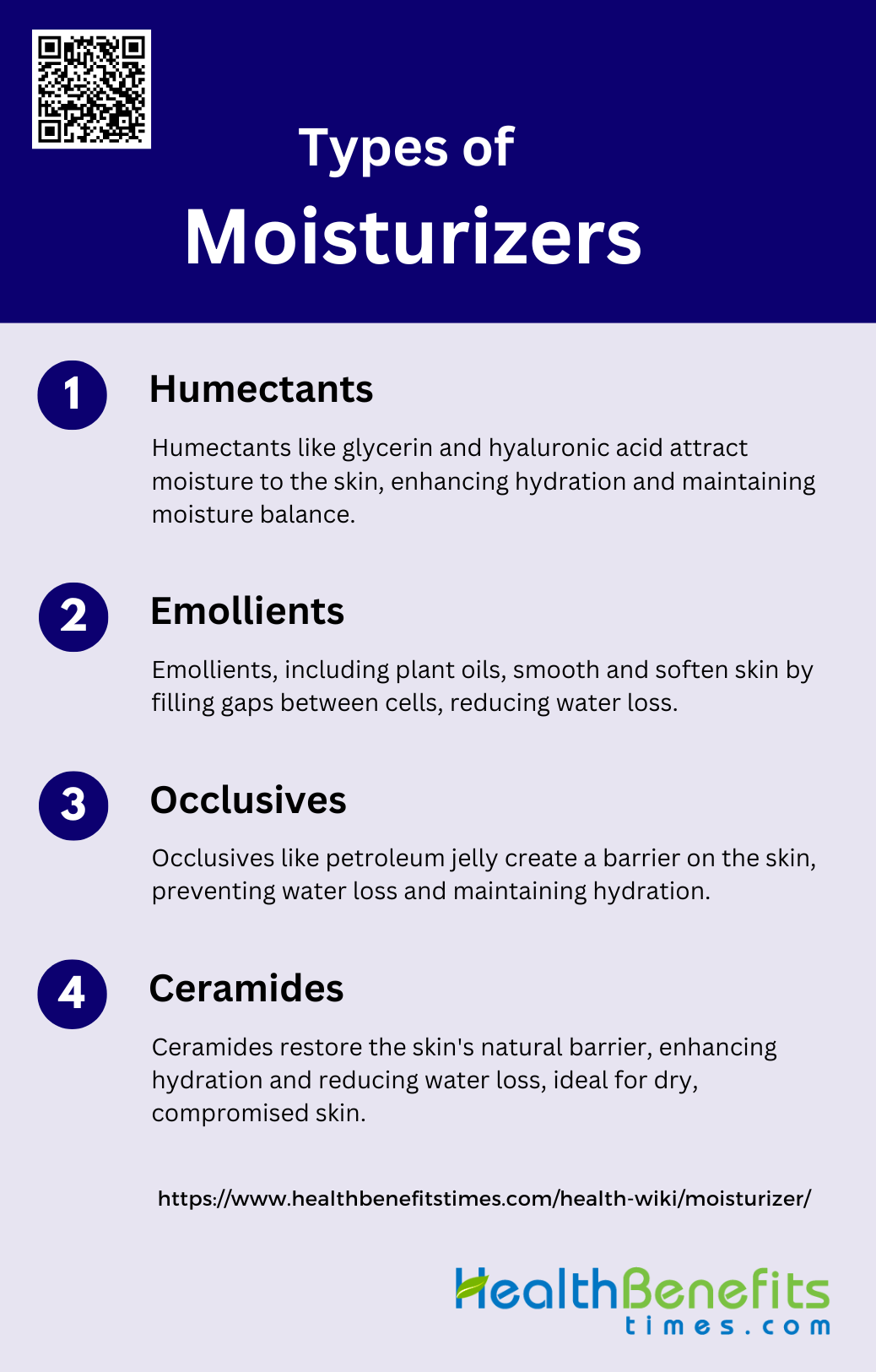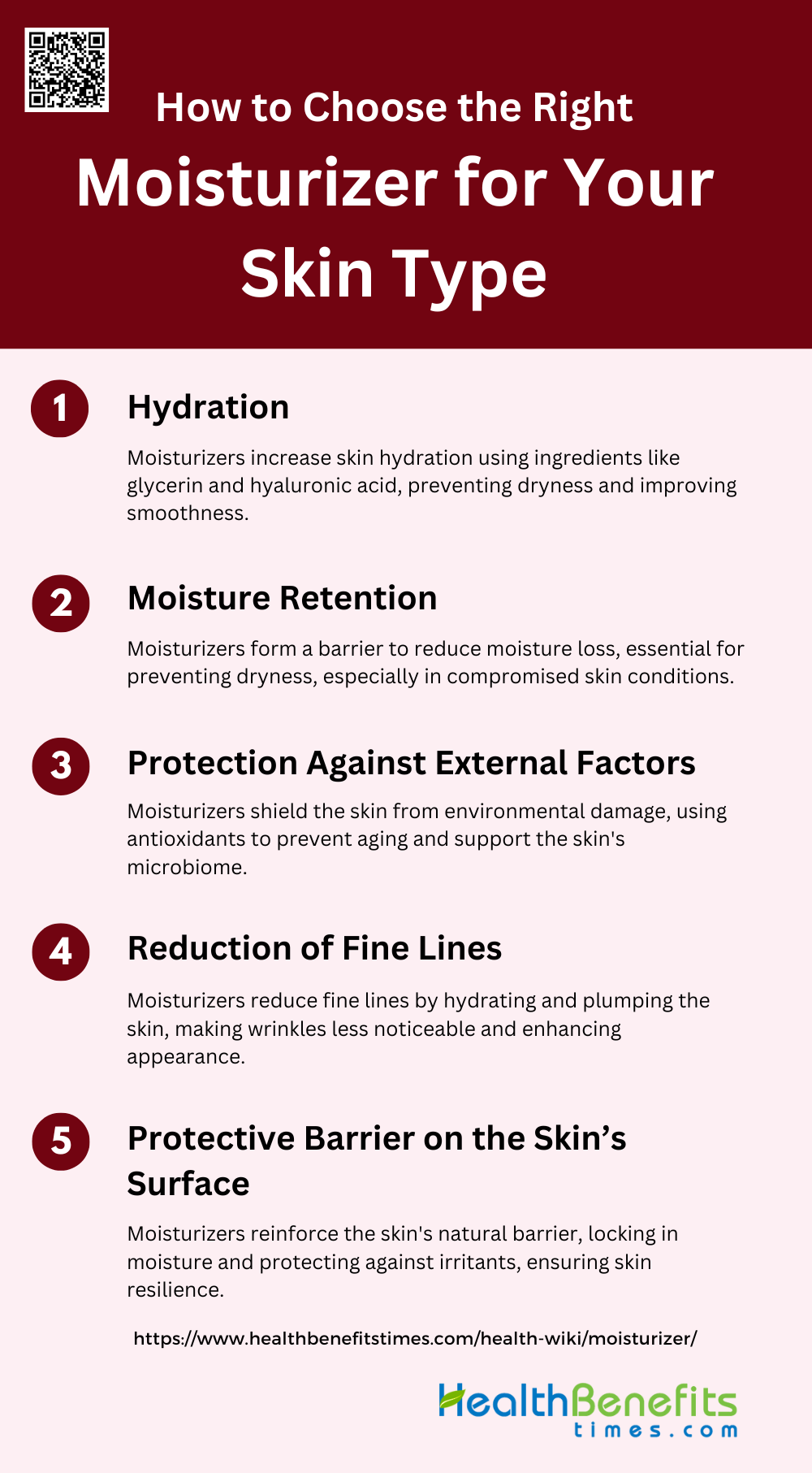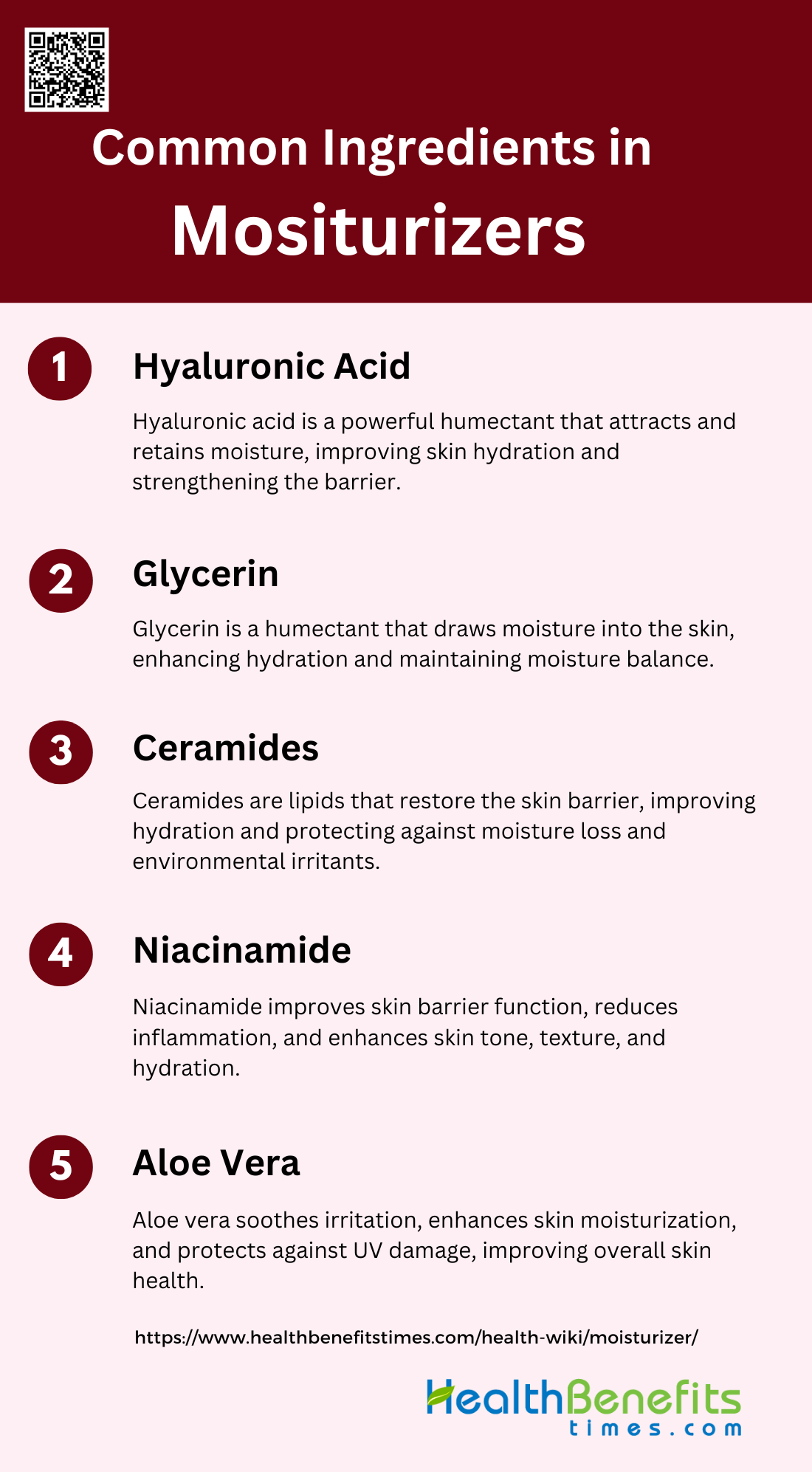A moisturizer is a topical product designed to maintain and enhance the skin’s hydration by reducing dryness and softening the skin’s surface. It works by compensating for the skin’s altered barrier function and increasing the water content in the epidermis. Moisturizers can be classified based on their primary mechanism of action: emollients, which soften and smooth the skin; humectants, which attract water to the skin; occlusives, which create a barrier to prevent water loss; and therapeutic moisturizers, which address specific skin conditions. Historically, moisturizers have evolved from simple natural ingredients like olive oil and animal fat to complex formulations that incorporate both ancient and modern ingredients, including mineral oils and high-tech scientific additions.
Key purposes of mositurizers
Moisturizers are essential skincare products designed to maintain and enhance the skin’s health and appearance. They serve multiple functions, from hydrating the skin to protecting it against environmental damage. Below are the key purposes of moisturizers:
1. Hydration
Moisturizers play a crucial role in enhancing skin hydration. They contain ingredients such as glycerin, hyaluronic acid, and ceramides that attract and retain water in the skin, thereby increasing its moisture content. Studies have shown that products like Ceramide cream significantly improve skin hydration levels over time, outperforming other reference moisturizers. Additionally, formulations containing hyaluronic acid and glycerin have demonstrated a marked increase in skin hydration for up to 24 hours after a single application. This hydration is essential for maintaining the skin’s smoothness and preventing dryness-related issues such as flakiness and irritation.
2. Moisture Retention
Moisturizers are designed to not only add moisture to the skin but also to help retain it. They achieve this by forming a barrier on the skin’s surface that reduces transepidermal water loss (TEWL). Ingredients like petrolatum and dimethicone are particularly effective in creating this barrier, thereby preventing moisture from escaping. Studies have shown that moisturizers can significantly decrease TEWL, which is crucial for maintaining skin hydration and preventing dryness. This moisture retention is especially beneficial for individuals with conditions like eczema, where the skin’s barrier function is compromised.
3. Protection Against External Factors
Moisturizers also provide a protective barrier against environmental aggressors such as pollution, UV radiation, and harsh weather conditions. This barrier helps to shield the skin from harmful external agents that can cause damage and exacerbate skin conditions. For instance, moisturizers containing antioxidants like vitamins C and E can protect the skin from free radical damage and prevent premature aging. Additionally, certain formulations have been shown to support the skin’s microbiome, enhancing its ability to fend off environmental stressors. This protective function is vital for maintaining overall skin health and preventing conditions like contact dermatitis.
4. Reduction of Fine Lines
One of the cosmetic benefits of moisturizers is their ability to reduce the appearance of fine lines and wrinkles. By keeping the skin well-hydrated, moisturizers help to plump up the skin, making fine lines less noticeable. Ingredients such as hyaluronic acid and glycerin are particularly effective in this regard, as they attract and retain water in the skin, providing a smoothing effect. Moreover, antioxidants present in some moisturizers can help to prevent the formation of new wrinkles by protecting the skin from oxidative stress. Regular use of moisturizers can thus contribute to a more youthful and radiant appearance.
5. Protective Barrier on the Skin’s Surface
Moisturizers form a protective barrier on the skin’s surface, which is essential for maintaining its integrity and function. This barrier helps to lock in moisture and protect the skin from irritants and allergens. Ingredients like ceramides and petrolatum are particularly effective in reinforcing the skin’s natural barrier, thereby improving its resilience. Studies have shown that moisturizers can enhance the skin’s barrier function, making it less susceptible to irritants and reducing the likelihood of conditions like atopic dermatitis. This protective barrier is crucial for maintaining healthy, resilient skin in the face of daily environmental challenges.
How Moisturizers Work
Moisture Retention
Moisturizers play a crucial role in retaining moisture within the skin, primarily by enhancing the water-holding capacity of the stratum corneum (SC). Humectants, such as glycerin, are key ingredients that attract water from the dermis into the epidermis, thereby increasing hydration levels. Occlusives, like petrolatum, form a barrier on the skin surface to minimize transepidermal water loss (TEWL) by preventing water from evaporating. Emollients also contribute by filling the gaps between skin cells, making the skin feel smoother and more flexible. Together, these components work synergistically to maintain optimal moisture levels and improve skin barrier function.
Skin Barrier Reinforcement
Moisturizers are essential in reinforcing the skin barrier, which is composed of physical, chemical, microbiologic, and immunologic layers. They help repair and maintain the integrity of these layers, especially in conditions where the barrier is compromised, such as atopic dermatitis and psoriasis. Acidic moisturizers support the chemical barrier by optimizing enzymatic functions and increasing ceramide production, which is vital for barrier repair. Regular use of moisturizers can also strengthen the immunologic barrier by reducing permeability, thereby decreasing allergen penetration and sensitization. This multifaceted approach ensures that the skin remains resilient against external irritants and pathogens.
Ingredient Roles
Moisturizers contain a variety of ingredients, each serving a specific function to enhance skin health. Humectants, such as glycerin and urea, attract and retain water in the stratum corneum, thereby improving hydration and reducing TEWL. Emollients, including lipids and ceramides, fill the spaces between skin cells, making the skin smoother and more flexible while also contributing to the occlusive effect. Occlusives, like petrolatum and dimethicone, form a protective barrier on the skin surface to prevent water loss and protect against environmental irritants. These ingredients work together to maintain skin moisture, improve barrier function, and enhance overall skin health.
Types of Moisturizers
Moisturizers come in various formulations to cater to different skin types and needs. Each type offers unique benefits and is designed to address specific skin concerns. Below are the main types of moisturizers:
1. Humectants
Humectants, such as glycerin and hyaluronic acid, are key ingredients in moisturizers that attract and retain moisture in the skin. They work by drawing water from the dermis into the epidermis and from the environment into the stratum corneum (SC), thereby increasing skin hydration. This mechanism helps maintain the skin’s moisture balance and improves its overall hydration level.
2. Emollients
Emollients, including plant oils and fatty acids, are used in moisturizers to smooth and soften the skin. They work by filling the gaps between skin cells, which helps to create a smoother skin surface. Emollients also contribute to the occlusive properties of moisturizers, enhancing the skin’s hydration by reducing water loss.
3. Occlusives
Occlusives, such as petroleum jelly and silicones, create a barrier on the skin’s surface to prevent water loss. This barrier function is crucial for maintaining skin hydration, especially in conditions where the skin barrier is compromised. Occlusives help to lock in moisture, thereby improving the skin’s barrier function and reducing transepidermal water loss (TEWL).
4. Ceramides
Ceramides are lipid molecules that are essential for maintaining the skin’s barrier function. They help to restore the skin’s natural barrier by replenishing lost lipids, which improves skin hydration and reduces TEWL. Ceramide-containing moisturizers have been shown to significantly increase skin hydration and improve barrier function, making them particularly effective for dry and compromised skin.
Benefits of Using a Moisturizer
Using a moisturizer is crucial for maintaining healthy and vibrant skin. It offers numerous benefits, from hydration to protection against environmental damage. Below are the key benefits of using a moisturizer:
1. Hydration
Moisturizers play a crucial role in enhancing skin hydration. Studies have shown that moisturizers containing ingredients that mimic the skin’s natural moisturizing systems significantly increase skin hydration levels. For instance, a single application of a ceramide-based cream resulted in a substantial increase in skin hydration over 24 hours compared to other reference moisturizers and placebo. Additionally, long-term use of moisturizers has been demonstrated to maintain elevated hydration levels in the skin, which is essential for preventing dryness and maintaining overall skin health.
2. Barrier Protection
Moisturizers are essential for maintaining and improving the skin barrier function. They help reduce transepidermal water loss (TEWL), which is a critical factor in preserving the skin’s barrier integrity. For example, a study on a hyaluronic acid and glycerin-based fluid showed a significant reduction in TEWL, indicating enhanced barrier protection. Moreover, moisturizers containing specific lipids, such as ceramides, have been shown to improve the barrier function in conditions like atopic dermatitis, thereby preventing further skin damage and irritation.
3. Anti-Aging Benefits
Moisturizers can also provide anti-aging benefits by protecting the skin from free radical damage and preventing premature aging. Ingredients like antioxidants, including vitamins C and E, are often incorporated into moisturizers to combat oxidative stress, which can lead to wrinkles, fine lines, and dark spots. Regular use of such moisturizers helps maintain skin elasticity and smoothness, thereby reducing the visible signs of aging and promoting a youthful appearance.
4. Improved Skin Texture
The use of moisturizers significantly improves skin texture by making it smoother and softer. This is achieved through the hydration and nourishment provided by the moisturizing agents, which help in maintaining the skin’s optical characteristics and overall appearance. For instance, a study on over-the-counter moisturizers demonstrated that they not only increased skin hydration but also improved the skin’s texture, making it more supple and less prone to roughness.
5. Soothing Irritation
Moisturizers are effective in soothing skin irritation and reducing inflammation. Ingredients like Centella asiatica extract and virgin coconut oil have been shown to possess anti-inflammatory properties, which help in calming irritated skin and promoting healing. These moisturizers can inhibit inflammatory markers and enhance the skin barrier function, making them suitable for conditions like eczema and other inflammatory skin disorders.
6. Prevention of Skin Disorders
Regular use of moisturizers can prevent various skin disorders by maintaining skin hydration and barrier function. For example, moisturizers are beneficial in managing conditions like eczema, psoriasis, and contact dermatitis by preventing excessive dryness and irritation. Studies have shown that moisturizers can significantly improve skin hydration and barrier function, thereby reducing the susceptibility to irritants and preventing the onset of skin disorders.
How to Choose the Right Moisturizer for Your Skin Type
Selecting the right moisturizer is crucial for maintaining healthy skin and addressing specific concerns. Different skin types require different formulations to achieve optimal results. Below are guidelines for choosing the right moisturizer based on your skin type:
1. Dry Skin
For individuals with dry skin, it is essential to use rich, creamy formulas that contain occlusives and emollients to lock in moisture and repair the skin barrier. Studies have shown that moisturizers containing ingredients like ceramides, which mimic the skin’s natural moisturizing systems, significantly increase skin hydration and improve barrier function. Additionally, emollients with ingredients such as aloe vera, wheat germ oil, and honey have been found to be effective in managing dry skin conditions by providing moisturizing, antimicrobial, and anti-inflammatory effects.
2. Oily Skin
People with oily skin should opt for lightweight, non-comedogenic, and oil-free moisturizers to avoid clogging pores and exacerbating oiliness. Research indicates that formulations designed to be non-comedogenic and oil-free are crucial for maintaining skin hydration without causing breakouts or additional oil production. These products often come in gel or lotion forms, which are less likely to leave a greasy residue compared to heavier creams.
3. Sensitive Skin
For sensitive skin, it is important to choose moisturizers that are fragrance-free, hypoallergenic, and contain soothing ingredients like aloe vera. Studies highlight the importance of avoiding potential allergens and irritants, as many popular moisturizers contain ingredients that can trigger reactions in sensitive skin. Products labeled as hypoallergenic and fragrance-free are generally recommended, although it is crucial to check for hidden allergens even in these products.
4. Combination Skin
Combination skin requires balancing moisturizers that can hydrate dry areas without causing oiliness in the T-zone. Research suggests that using products with a balanced formulation of humectants and lightweight emollients can help manage the diverse needs of combination skin. These moisturizers should provide adequate hydration to dry areas while being light enough to prevent excess oil in the oily zones.
5. Mature Skin
Mature skin benefits from anti-aging moisturizers that contain ingredients like peptides and antioxidants to address signs of aging. Studies have shown that moisturizers with added specialty ingredients, such as peptides and antioxidants, can enhance skin function and provide anti-aging benefits. These ingredients help to improve skin elasticity, reduce the appearance of fine lines, and protect against environmental damage.
Common Ingredients in Moisturizers
Moisturizers contain a variety of ingredients that cater to different skin needs and concerns. Understanding these ingredients can help you choose the best product for your skin type. Below are some common ingredients found in moisturizers:
1. Hyaluronic Acid
Hyaluronic acid (HA) is a powerful humectant that plays a crucial role in skin hydration. It has the ability to attract and retain water molecules, significantly enhancing the moisture content of the skin. Studies have shown that HA can improve skin hydration for up to 24 hours after a single application, making it an effective ingredient in moisturizing products. Additionally, HA can help in reducing transepidermal water loss (TEWL), thereby strengthening the skin barrier and preventing moisture loss. Its hydrating properties make it particularly beneficial for individuals with dry or dehydrated skin.
2. Glycerin
Glycerin is another well-known humectant that attracts moisture from the environment and helps to retain it in the skin. It is often used in moisturizers to enhance skin hydration and improve skin barrier function. Research indicates that glycerin can significantly increase skin hydration levels and reduce TEWL, thereby maintaining the skin’s moisture balance. Glycerin’s ability to draw water into the skin makes it an essential ingredient in formulations aimed at treating dry skin conditions, such as eczema and atopic dermatitis.
3. Ceramides
Ceramides are lipid molecules that are naturally found in high concentrations within the cell membranes of the stratum corneum, the outermost layer of the skin. They play a vital role in maintaining the skin barrier and retaining moisture. Studies have demonstrated that ceramide-containing formulations can significantly improve skin hydration and barrier function, making them effective in treating dry and barrier-disrupted skin. Ceramides help to restore the skin’s natural barrier, preventing moisture loss and protecting against environmental irritants.
4. Niacinamide
Niacinamide, also known as vitamin B3, offers multiple benefits for skin tone and texture. It has been shown to improve the integrity of the stratum corneum, thereby enhancing the skin barrier function and reducing TEWL. Niacinamide also possesses anti-inflammatory properties, which can help to reduce redness and blotchiness, making it beneficial for individuals with sensitive or acne-prone skin. Additionally, it can improve the appearance of enlarged pores, uneven skin tone, and fine lines, contributing to a smoother and more even complexion.
5. Aloe Vera
Aloe vera is renowned for its soothing and calming properties, making it a popular ingredient in skincare products aimed at reducing irritation and inflammation. It has been shown to enhance skin moisturization by regulating the expression of proteins involved in skin hydration and barrier function. Aloe vera can also protect against UV-induced photodamage and improve the overall health of the skin. Its ability to modulate various epidermal differentiation markers and moisturization-related factors makes it an effective ingredient for maintaining skin flexibility and preventing dryness.
How to Use Moisturizer Effectively
When to Apply
Applying moisturizer at the right times can significantly enhance its effectiveness. Research indicates that the best times to apply moisturizer are in the morning and at night. Morning application helps to protect the skin from environmental aggressors throughout the day, such as pollution and UV radiation, while nighttime application aids in skin repair and regeneration during sleep. A study on the effects of moisturizers on the skin barrier and microbiome found that consistent use of moisturizers improved skin barrier function and surface moisture content, which was maintained even after the trial period. Additionally, twice-daily moisturization is recommended for managing conditions like atopic dermatitis, as it significantly improves the skin barrier and reduces the incidence of flares.
Application Tips
The technique used to apply moisturizer can impact its effectiveness. It is generally recommended to pat the moisturizer onto the skin rather than rubbing it in. Patting helps to ensure that the product is absorbed evenly and reduces the risk of irritating the skin. This method is particularly beneficial for sensitive skin types or those with conditions like atopic dermatitis, where gentle application is crucial. Studies have shown that proper application techniques, combined with the use of clinically tested moisturizers, can enhance skin barrier function and maintain skin hydration. Therefore, adopting a gentle patting technique can maximize the benefits of your moisturizer.
Layering with Other Skincare Products
Integrating moisturizers with other skincare products like serums, sunscreens, and treatments requires a strategic approach to maximize benefits. Typically, the correct order is to apply products from the thinnest to the thickest consistency. Start with serums, which are usually lightweight and packed with active ingredients, followed by treatments if needed, and then apply your moisturizer to lock in hydration. Finally, apply sunscreen as the last step in your morning routine to protect against UV damage. Research highlights the importance of using moisturizers that support the skin barrier and microbiome, especially when exposed to environmental aggressors. For those with atopic dermatitis, using a therapeutic moisturizer twice daily can help manage symptoms and improve skin health.
FAQs
1. Can moisturizers be used on all skin types, including oily and acne-prone skin?
Yes, there are moisturizers specifically formulated for oily and acne-prone skin. These products are typically non-comedogenic, meaning they won’t clog pores, and are designed to provide hydration without increasing oiliness or causing breakouts.
2. How often should I reapply moisturizer during the day?
The frequency of reapplication depends on your skin type and environment. Generally, moisturizing twice a day (morning and night) is sufficient, but you may need to reapply more often if your skin feels dry, especially in harsh weather conditions or in an air-conditioned environment.
3. Can I use the same moisturizer for my face and body?
While you can use the same moisturizer for both your face and body, it’s generally better to use products specifically formulated for each area. Facial skin is more delicate and may require a lighter, non-comedogenic formula, whereas body moisturizers can be richer to address thicker skin areas like elbows and knees.
4. Is it necessary to use a separate eye cream, or can I use my regular moisturizer around the eyes?
Eye creams are formulated to be gentler and specifically target concerns like puffiness, dark circles, and fine lines around the delicate eye area. However, if your regular moisturizer is gentle and fragrance-free, it can be used around the eyes unless you have specific concerns that require an eye cream.
5. Do I need to moisturize even if I have naturally oily skin?
Yes, moisturizing is important for all skin types, including oily skin. Skipping moisturizer can actually lead to increased oil production as your skin compensates for the lack of moisture. Opt for a lightweight, oil-free moisturizer that hydrates without clogging pores.
6. Can moisturizers help with skin conditions like eczema or rosacea?
Yes, there are moisturizers specifically designed for conditions like eczema and rosacea. These products usually contain ingredients that help soothe irritation, reduce inflammation, and strengthen the skin barrier, which are essential for managing these conditions.
7. Is it necessary to change my moisturizer based on the season?
Yes, it’s often beneficial to switch moisturizers with the changing seasons. In winter, a richer, more hydrating moisturizer may be needed to combat dryness, while in summer, a lighter, oil-free moisturizer can help manage sweat and humidity.
8. Can using too much moisturizer cause any negative effects on the skin?
Over-moisturizing can sometimes lead to clogged pores and breakouts, particularly in people with oily or acne-prone skin. It can also create a dependency where your skin reduces its natural oil production. It’s important to use an appropriate amount for your skin type and needs.
9. How can I tell if a moisturizer is not working well for my skin?
If you notice increased dryness, irritation, redness, breakouts, or if your skin feels greasy or heavy, the moisturizer may not be suitable for your skin type. It’s essential to pay attention to how your skin reacts and adjust your skincare routine accordingly.
10. Are natural or organic moisturizers better for the skin compared to synthetic ones?
The effectiveness of a moisturizer depends on its ingredients and formulation rather than whether it is natural or synthetic. Both natural and synthetic moisturizers can be beneficial, but it’s crucial to choose a product that suits your skin type and addresses your specific skin concerns.


